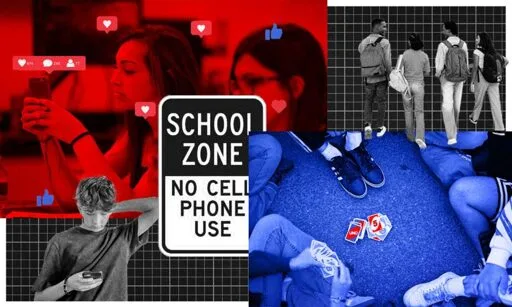Support for Phone Bans in Schools Is Growing, but Is It Enough to Help Kids?
Support for Phone Bans in Schools Is Growing, but Is It Enough to Help Kids?

Support for Phone Bans in Schools Is Growing, but Is It Enough to Help Kids?

New York City schools have had a long history of phone restriction policies, with an outright ban in the early 2000s that was reversed about 10 years later. Individual schools, like the ones where Corletta and Leston teach, have had the freedom to implement their own restrictions.
That will change again in the new academic year as all schools in New York state will implement a bell-to-bell ban — one of the strictest among dozens of other states that have passed similar legislation — barring students from access to personal devices that can connect to the internet for the entire school day. Schools will be required to provide storage for the devices.
But with such new policies, many being implemented for the first time this school year or in effect for less than two years, no one knows what the perfect model looks like.
Researchers are moving cautiously as they grapple with uncertainty about the effectiveness of in-school phone bans on mental health. Data yields mixed results — and there’s growing a sentiment that more has to be done outside of schools to get kids off their phones and back into the world.
A recent Pew Research survey found that nearly three quarters of Americans support restrictive phone use in schools, up six percentage points since last year — but many are also unsure how far the bans should go. About 44% of respondents supported all day bans, with others split on whether students should have access to their phones between classes or at lunch.
Bell to Bell bans are fine in my honest opinion.
I do not acknowledge the mandate that all children must have constant access to their phones. Students who have a legitimate reason to carry their phones on their person at all times should be supported by their parents with a request to the school administration. School admins who receive such requests by parents should accept them with no questions asked, and only confiscate the device from the student if they are found to be misusing it or disrupting a class with it; no "If I see it; I snatch it" rules are to be allowed.
If schools have to issue "Phone-allowed Hall Passes" constantly; it disrupts class. If a student can be issued a personal pass that discloses they're allowed to keep their phone on them, per parental request for a legitimate reason, think medical reasons or reasons related to disability and note taking, there's less interruption if a student needs to make a critical phone call to get help.
I do believe schools should provide and encourage device storage. Students of appropriate ages should be allowed to access them in storage during break times. Teaching students the ability to self-disconnect from their mobile devices is important. This can be done efficiently and without cruelty. Responsible students with fewer phone infractions can be permitted to carry their phone more often or during wider hours of the day; while those who do misuse their phones or disrupt classes with them can be forced to keep their phones in storage from bell to bell as the law suggests.